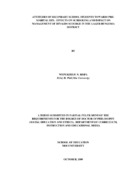| dc.description.abstract | A study was carried out in the rural setup of the larger Bungoma District to determine
the attitudes of secondary school students towards pre-marital sex (PMS) and the
possible impact on school performance and implications for prevention of HIV/AIDS.
The study used sets of questionnaires and interview schedules to collect data from 284
form three students, head-teachers and guidance and counselling teachers from
selected secondary schools, At community level, data was collected from parents and
community-based religious leaders. Student health and class performance records
were collected to identify victims of PMS and assess their performance.
Descriptive statistics were used in data analysis and interpretation. Chi square (χ2
) test
was used to test whether there was significant association between attitude or
behaviour of the youth and school type, gender and household socio-economic status.
Analysis of variance (ANOVA) and t-statistics were performed to determine whether
PMS had a significant effect on academic performance of known cases of PMS and to
confirm whether PMS was a significant practice among secondary school students,
respectively.
It was found out that PMS was a common practice among the students though they
generally had favourable attitude towards PMS. The practice was consistent with the
unfavourable attitude towards PMS as a tool for expression of intimacy and love.
Inadequate communication between parents and the students, lack of comprehensive
sexuality education curriculum in schools and programmes in churches left peers and
the media as the major source of sexuality information. This impacted negatively on
the attitudes and sexual behaviour among the youth. High PMS prevalence impacted
negatively on the education sector in terms of decreased completion rate and poor
class performance.
From the results, it was concluded that the high prevalence of PMS among students in
secondary schools in the larger Bungoma District is due to the perception of sex as a
tool for intimacy and expression of love.
It is recommended that a comprehensive curriculum be developed and introduced in
schools at an appropriate stage preferably at upper primary level to equip the youth
with right information to help them make informed decisions about sexuality later in
their school life. Such curriculum will in addition prepare the youth to confidently
face the challenges as future parents. It also recommended that teachers be trained to
handle sexuality issues among the youth and to strengthen positive peer group
counselling programmes | en_US |

